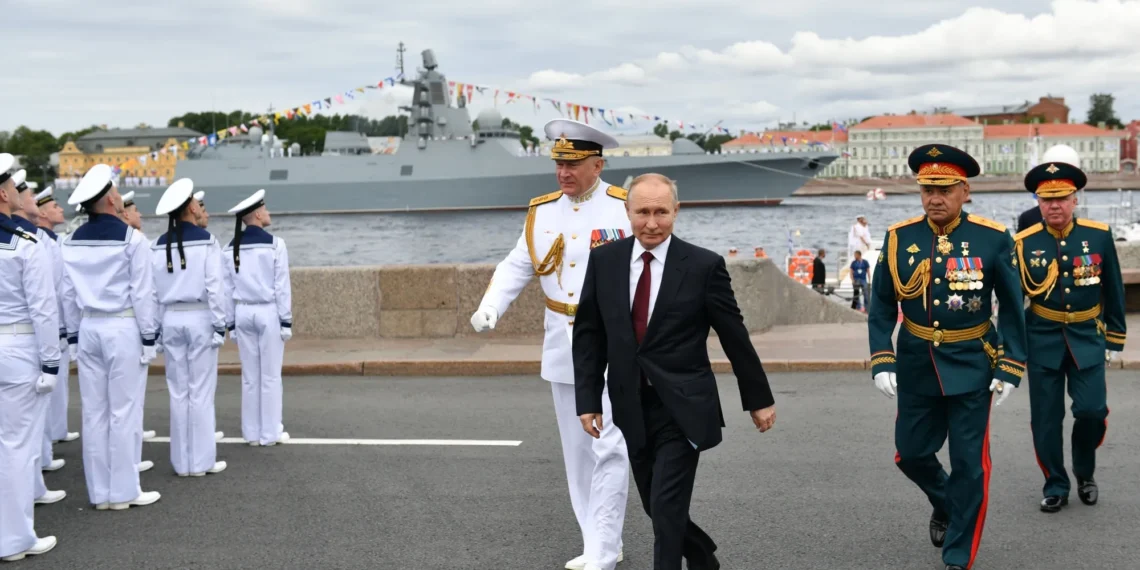Russian officials have issued stern warnings in response to what they describe as Western efforts to disrupt Russia’s maritime operations in the Baltic Sea. Nikolai Patrushev, a close aide to President Vladimir Putin and Chairman of the Russian Maritime Board, has accused NATO countries of attempting to isolate Russia by imposing restrictions on its shipping activities in the region.
Blockade on Russia
The threats posed by NATO are rapidly growing,” the presidential aide Patrushev said, claiming that the western bloc has effectively dismantled the international security architecture established after World War II. NATO is now “stepping up its presence” in the Baltic region and expanding its “combat and reconnaissance capabilities,” Patrushev, who also chairs the Maritime Board, warned.
He added that these actions are part of a broader effort by Ukraine’s Western backers to increase pressure on Russia. According to Patrushev, Western countries are preparing legislation that would allow them to inspect vessels operating in Russia’s interests in international waters. They are also considering measures to restrict the navigation of these ships in the Baltic Sea or even block their passage through international straits.
Against this background, the Western nations are de facto committing acts of piracy,” he said, citing an “attempt by the Estonian Navy, backed by NATO aircraft, to detain a civilian vessel in the Gulf of Finland.”
Patrushev was referring to an incident on May 13 involving the Jaguar, a Gabon-flagged ship en route to a Russian port, which the Estonian Navy tried to detain.
He also acknowledged that Estonia “has started to harass” what he described as Russia’s “shadow fleet” – a term used in the West to refer to tankers operating outside Western insurance systems.
Last month, Patrushev warned that the EU and UK plans to tighten maritime restrictions on Russia “increasingly resemble a naval blockade.” He added that if diplomatic and legal means fail, Russia would be ready to deploy its navy to safeguard navigation.
Patrushev has also expressed concerns about the strategic Russian exclave of Kaliningrad, alleging that Western nations are attempting to isolate the region by disrupting transportation links. He claims that these actions are part of a broader effort to “paralyze” Russian ports in the Leningrad and Kaliningrad regions, thereby hindering Russia’s access to vital maritime routes.
Russia’s Retaliation Strategy
In response, Russia is preparing a multi-pronged retaliation plan:
Reciprocal Detentions: Russian naval forces have already detained a Greek-owned oil tanker believed to be linked to NATO operations. Although the ship was later released, Russia has warned that any further detentions will result in symmetrical actions.
Increased Naval Patrols: The Baltic Fleet has stepped up its presence around Kaliningrad and other key transit points, signaling Moscow’s readiness to use force to secure shipping lanes.
Legal and Economic Countermeasures: Russia is considering filing formal complaints with international maritime organizations and may impose its shipping restrictions on European vessels transiting near Russian waters.
Cyber and Hybrid Tactics: Analysts warn that Russia could employ cyberattacks or electronic warfare to disrupt port operations in the Baltic, particularly in Estonia, Latvia, and Lithuania.
Both Russia and NATO have called for “readiness and restraint,” yet neither side appears willing to back down. The situation in the Baltic is now viewed as a potential flashpoint in the evolving confrontation between Russia and the West.
If tensions continue to rise, experts warn the Baltic Sea may transition from a contested trade zone into a militarized confrontation front—bringing Europe closer to the edge of a maritime crisis.








